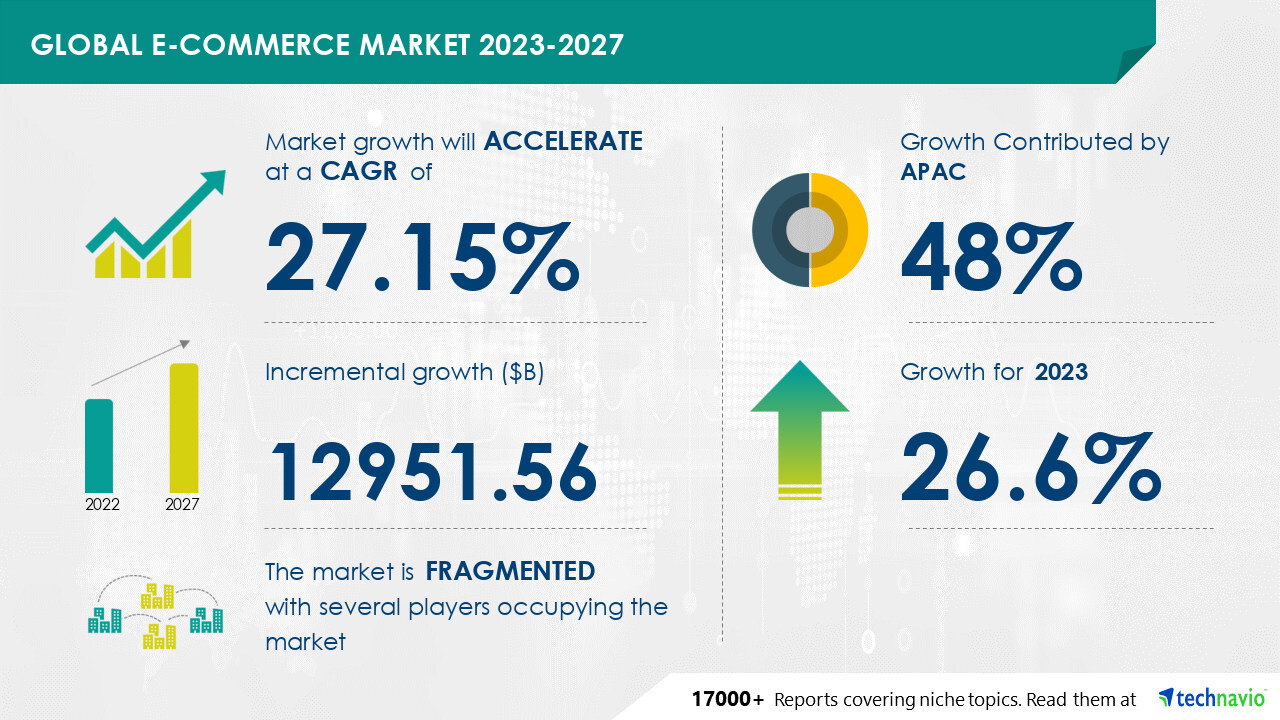NEW YORK, July 15, 2024 -- The global E-commerce market size is estimated to grow by USD 12.95 billion from 2023-2027, according to Technavio. The market is estimated to grow at a CAGR of almost 27.15% during the forecast period. Advantages of E-commerce platforms is driving market growth, with a trend towards enhancement of consumer experience through technologies. However, regulatory issues poses a challenge. Key market players include Alibaba Group Holding Ltd, Amazon.com Inc., Apple Inc., Best Buy Co. Inc., Costco Wholesale Corp., Ebates Performance Marketing Inc., eBay Inc., Flipkart Internet Pvt. Ltd., Groupon Inc., Inter IKEA Systems B.V., JD.com Inc., Lojas Americanas S.A., Otto GmbH and Co. KG, priceline.com LLC, Shopify Inc., The Home Depot Inc., Walmart Inc., Wayfair Inc., Zalando SE, and Etsy Inc..
Get a detailed analysis on regions, market segments, customer landscape, and companies - Click for the snapshot of this report
Forecast period | 2023-2027 |
Base Year | 2022 |
Historic Data | 2017 - 2021 |
Segment Covered | Application (Home appliances, Fashion products, Groceries, Books, and Others), Type (B2B and B2C), and Geography (APAC, North America, Europe, South America, and Middle East and Africa) |
Region Covered | APAC, North America, Europe, South America, and Middle East and Africa |
Key companies profiled | Alibaba Group Holding Ltd, Amazon.com Inc., Apple Inc., Best Buy Co. Inc., Costco Wholesale Corp., Ebates Performance Marketing Inc., eBay Inc., Flipkart Internet Pvt. Ltd., Groupon Inc., Inter IKEA Systems B.V., JD.com Inc., Lojas Americanas S.A., Otto GmbH and Co. KG, priceline.com LLC, Shopify Inc., The Home Depot Inc., Walmart Inc., Wayfair Inc., Zalando SE, and Etsy Inc. |
Key Market Trends Fueling Growth
E-commerce market growth is driven by technological advancements in various sectors, including home decor. Vendors integrate technologies like augmented reality (AR) and virtual reality (VR) to enhance customer experience. In May 2019, IKEA launched a VR app, enabling users to input room dimensions and virtually try home decor products. The app displays different colors, textures, and similar items, aiding customers in making informed decisions. Once satisfied, they can order products directly through the app. Such innovations will continue fueling the global e-commerce market expansion.
The E-Commerce Market is booming, driven by the increasing smartphone-using population and rising internet penetration. Digital content in travel and leisure, financial services, and other sectors is attracting more consumers to shop online. E-tailing is becoming the norm, with established organizations and large enterprises adopting the marketplace model and direct models to reach an internet-connected client base. Technological awareness and user experience are key factors in online purchasing. The adoption of smartphones and 5G Wi-Fi is making browsing and online marketing tools like Google ads and Facebook ads more effective. Operational costs, inventory costs, and payment gateways through banks and retailers are crucial considerations. Vertical marketplaces and specialized marketplaces cater to specific consumer needs. Major e-commerce players are investing in communication, infrastructure, and social media applications to expand their reach. The middle-class population is embracing online shopping, making it a significant trend in the E-Commerce Market.
Discover 360° analysis of this market. For complete information, schedule your consultation- Book Here!
Market Challenges
- The global e-commerce market faces regulatory challenges, including inconsistent laws and taxation policies. For instance, developed countries like the US grapple with the application of central and state taxes on e-commerce transactions. This inconsistency in regulations is more pronounced in less-developed countries. Furthermore, governments in various nations differentiate between domestic and international e-commerce websites to promote local employment and business opportunities. Consequently, international e-commerce companies must incorporate locally to access regional benefits. Additionally, legal limitations vary by country, with specific rules governing the sale of items such as food, weapons, alcohol, and antiques. Failure to comply with these requirements can put e-commerce businesses at risk.
- The E-Commerce Market is witnessing significant growth due to the rising internet penetration and increasing online purchasing by the middle-class population. However, several challenges persist. Communication with customers can be difficult, requiring effective use of online marketing tools like Google ads and Facebook ads, as well as social media applications. Infrastructure, including technical infrastructure and payment gateways, must be robust to ensure a seamless customer experience. Operational and inventory costs are major concerns for retailers, especially for vertical and specialized marketplaces. Major e-commerce players like Alibaba and Bharat Craft are investing in infrastructure and operational efficiency. Online retail is increasingly moving towards branded shopping apps, social media, and even the metaverse, utilizing technologies like augmented reality and virtual reality. Payment gateways and banks play a crucial role, ensuring secure transactions. Social media is a powerful marketing tool, but operational costs and consumer tastes can be unpredictable. Retailers must navigate the marketplace model, direct model, and the role of government initiatives like GeM and MSMEs. The challenges are numerous, but the potential rewards are immense.
For more insights on driver and challenges - Download a Sample Report
Segment Overview
This e-commerce market report extensively covers market segmentation by
- Application
- 1.1 Home appliances
- 1.2 Fashion products
- 1.3 Groceries
- 1.4 Books
- 1.5 Others
- Type
- 2.1 B2B
- 2.2 B2C
- Geography
- 3.1 APAC
- 3.2 North America
- 3.3 Europe
- 3.4 South America
- 3.5 Middle East and Africa
1.1 Home appliances- The home appliances segment in the e-commerce market encompasses consumer electronics, houseware, and kitchen appliances. This segment is matured and has experienced a decelerating growth rate in recent years. A major challenge for this segment is the absence of a comprehensive logistics platform for online home appliance delivery. In developing countries, logistical hurdles pose significant issues. Despite these challenges, the home appliances segment is projected to remain the largest revenue generator in the global e-commerce market due to the rising living standards worldwide. Two primary reasons for the segment's high revenue are the growing credibility of e-commerce brands and the consumer trend towards upgrading homes. Additionally, recycling initiatives have contributed to the decrease in consumer-generated electronic waste, making the segment more sustainable. However, many consumers still prefer purchasing home appliances from brick-and-mortar stores to examine them physically. To cater to this preference, online retailers are establishing showrooms, offering multichannel shopping experiences. These showrooms allow consumers to test products and ask questions before buying, bridging the gap between online and offline shopping
For more information on market segmentation with geographical analysis including forecast (2023-2027) and historic data (2017 - 2021) - Download a Sample Report
Learn and explore more about Technavio's in-depth research reports
The global digital shipment market is experiencing significant growth driven by the rise in e-commerce, advanced tracking technologies, and the demand for faster delivery services. Key players are focusing on integrating AI and IoT for efficient logistics solutions. In Kuwait, the e-commerce market is booming, fueled by high internet penetration and a tech-savvy population. Major players like Amazon and local startups are expanding their presence, offering diverse product ranges and competitive delivery options, making Kuwait a growing hub for online shopping in the Middle East.
Research Analysis
The e-commerce market is experiencing explosive growth, fueled by the smartphone-using population's increasing adoption. With the proliferation of digital content, industries such as travel and leisure, financial services, and e-tailing are seeing significant shifts towards online platforms. Technological awareness and connectivity have become essential, driving the user experience to new heights. The rise of online shopping has been meteoric, with consumer wealth playing a crucial role in its expansion. Established organizations and large enterprises are embracing e-commerce, leveraging online marketing tools like Google ads and Facebook ads, and social media applications to reach customers. Buying and selling goods and services have become more accessible than ever before, leading to operational costs and inventory costs being reevaluated. Vertical marketplaces and specialized marketplaces cater to niche industries, providing unique offerings and competition. The e-commerce landscape is constantly evolving, requiring businesses to stay informed and adapt to the changing market.
Market Research Overview
The E-Commerce Market is experiencing exponential growth, fueled by the smartphone-using population and their increasing digital content consumption. Travel and leisure, financial services, and various industries are embracing e-tailing, driven by technological awareness and the adoption of smartphones. The user experience is paramount, with connectivity and online marketing tools like Google ads and Facebook ads playing crucial roles. Established organizations and large enterprises communicate with their customer base through various channels, including social media applications. Operational costs, inventory costs, and payment gateways are essential considerations for retailers. Vertical marketplaces and specialized marketplaces cater to niche segments, while the marketplace model and direct model offer different approaches. The middle-class population's growing wealth and online purchasing power are significant factors. Infrastructure, rising internet penetration, and consumer tastes continue to shape the e-commerce landscape. Mobile, online retail, branded shopping apps, 5G Wi-Fi, social shopping, customer experience, augmented reality, virtual reality, and the metaverse are shaping the future of online business. Bharat Craft, Alibaba, MSMEs, and GeM are key players in this dynamic market.
Table of Contents:
1 Executive Summary
2 Market Landscape
3 Market Sizing
4 Historic Market Size
5 Five Forces Analysis
6 Market Segmentation
- Application
- Home Appliances
- Fashion Products
- Groceries
- Books
- Others
- Type
- B2B
- B2C
- Geography
- APAC
- North America
- Europe
- South America
- Middle East And Africa
7 Customer Landscape
8 Geographic Landscape
9 Drivers, Challenges, and Trends
10 Company Landscape
11 Company Analysis
12 Appendix
About Technavio
Technavio is a leading global technology research and advisory company. Their research and analysis focuses on emerging market trends and provides actionable insights to help businesses identify market opportunities and develop effective strategies to optimize their market positions.
With over 500 specialized analysts, Technavio's report library consists of more than 17,000 reports and counting, covering 800 technologies, spanning across 50 countries. Their client base consists of enterprises of all sizes, including more than 100 Fortune 500 companies. This growing client base relies on Technavio's comprehensive coverage, extensive research, and actionable market insights to identify opportunities in existing and potential markets and assess their competitive positions within changing market scenarios.
Contacts
Technavio Research
Jesse Maida
Media & Marketing Executive
US: +1 844 364 1100
UK: +44 203 893 3200
Email: media@technavio.com
Website: www.technavio.com/
This News is brought to you by Qube Mark, your trusted source for the latest updates and insights in marketing technology. Stay tuned for more groundbreaking innovations in the world of technology.









